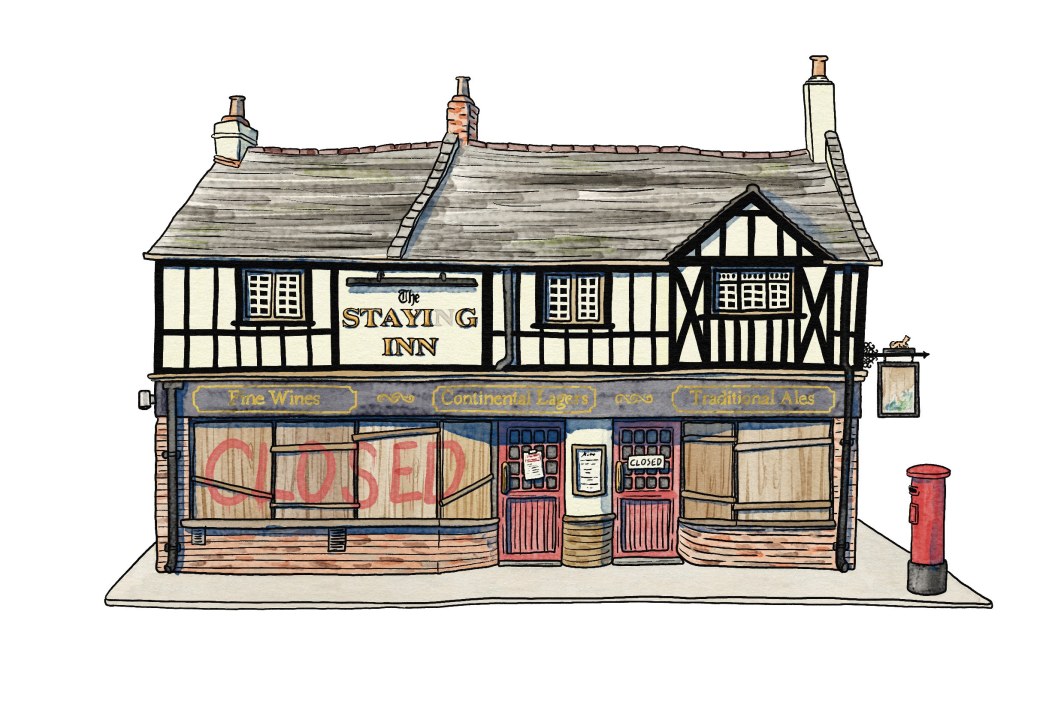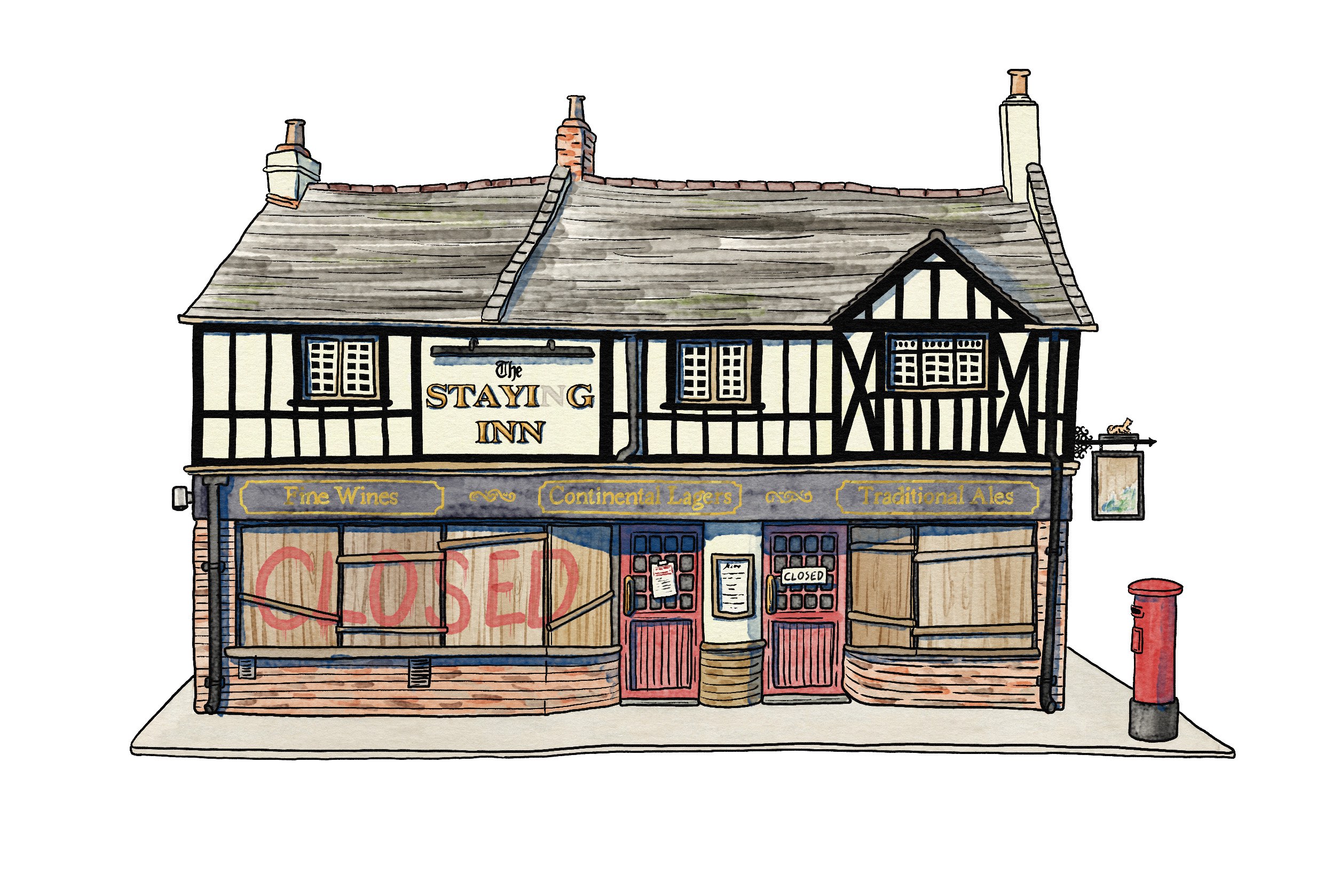In Bradford a few weeks ago, I popped into a pub called Jacobs Well. It’s a squat old building, all but submerged behind the stultifyingly ugly road that grinds around the edges of the town centre. The Well was fairly quiet on a Monday night, but everyone there was congregated around the bar and it was immediately apparent that this was a place where long friendships are nurtured and strangers are welcomed. There were interesting cask ales, free hotpot and doorsteps of bread on a side table for anyone who fancied a meal, wonderful photos of old Bradford on the walls and a blackboard chock-full of handwritten notices advertising upcoming band nights and quizzes.
The Jacobs Well probably doesn’t make huge profits. But, as a northerner who has lived in London for 25 years, it made me feel almost tearfully atavistic. ‘Yes,’ I insisted to my fiancée, who grew up in Chelsea and has never lived outside of the capital, ‘this is a pub that knows how to be a pub.’
Contrast this to my last London pub experience in a hostelry which seemed entirely baffled by the concept of an individual wandering in and sitting down with a drink spontaneously. Broadsided by staff wearing basilisk stares, my path was blocked as they interrogated me as to whether I had a booking. When I stated that I hadn’t – and that I had no wish to order a meal – it was as if I’d asked them to solve cold fusion on the spot, or if I could rummage through their house while they’re on holiday.
Depressingly, I (along with many Londoners I suspect) have become used to this kind of hostility from boozers that yearn to be restaurants but have grudgingly settled for gastropub status. Islington seems to be the worst neighbourhood for this long-established landlord trend of hoping that, by charging £32 for a plate of fish, mere drinkers and peanut-munchers will get the message and seek their pint elsewhere.
But the Stasi-esque collaring I recently received was in an entirely mediocre Streatham boozer that harboured no culinary ambitions beyond serving up flimsy looking burgers. I suspect it won’t be long before this pub ‘does an Islington’ and ups its epicurean game to the point where the remnant locals flee to another pub, if they can find one, or simply decide to drink beer in their living room of an evening from now on.
Even if a pub has a posh kitchen, handwritten menus and doesn’t smell of Embassy tips, it is still a pub, and the point of pubs is that you should be able to saunter in at any time you please and be served a pint of beer to sip while propped against the bar counter. Yet despite the desperate state of the UK pub economy, the strategy now seems to be that of excluding anyone who isn’t prepared to shell out three figures on a bottle of Pouilly-Fumé and a three-course meal of game meat, ‘sustainably caught’ fish and organic cheeses.
The point of pubs is that you should be able to saunter in at any time you please and be served a pint of beer to sip while propped against the bar counter
Incredibly, it’s far easier to wander into a restaurant without a booking than into many pubs in London at the moment. But, and sorry if this sounds axiomatic, if I want a restaurant meal then I’ll go to a restaurant. The contrapuntal fraud of London pubs in 2025 is their desire to charge restaurant prices while only offering lackadaisical grog-shop levels of service
I played a game with some friends the other Sunday after having, grudgingly, booked in advance for a roast in one Tooting boozer. We counted seven members of staff who were either chatting among themselves, picking their noses or chugging energy drinks. We were the only people left in the dining area, which, inevitably, now spans 90 per cent of the entire pub space. After spending close to £200 between the four of us, we decided to see how long it would take for any of the seven staff members to come to clear our table.
After 50 minutes we gave up and called them over to ask if they wouldn’t mind doing a tiny bit of work. Would this happen in a restaurant? Unlikely. And the cost of our roast wouldn’t have been much more if we’d decided to dine at the Goring.
We bemoan, quite rightly, the shocking acceleration of pub closures in this country. But what we’re not talking about as much is the pitiful, bowdlerised state of the pubs that remain and the mean processes of faux-gentrification and status-shifting they are so badly attempting in order to stay in business. If it’s a choice between a pub turning into a block of flats or turning into a place that is actively scornful of anyone wandering in off the street with the urge for a seat, a pint and a bag of crisps, then I’m not entirely sure that the flats option is any more nefarious.
If pubs (in London in particular) want to make a comeback then the only way to do it is to make them places that don’t seemingly aspire to the exclusivity (and prices) of Scott’s or Wiltons. Wetherspoons has shown that, with low prices and long opening hours, pubs can still look pretty busy most of the time. How difficult would it be for traditional inns, taverns and hostelries to swap larcenous prices for the few into lower prices for the many?
Start opening for breakfast; make sure at least 50 per cent of the pub is for drinkers; encourage community meetings, book clubs, acoustic sessions and so on to be held in the vault rooms. Have all the daily newspapers splayed out at the bar; let dogs drink water out of old ashtrays; have a liberal approach to smoking in the beer garden; have some basic homemade sandwiches priced at £3 each on sale every lunchtime; and don’t get all antsy if someone accidentally sits in the ‘dining area’ but only wants a gin and tonic.
These are the simple, albeit hardly innovative, tactics that landlords of free houses urgently need to start deploying, rather than putting wood pigeon on the menu for £35 and snarling at anyone who didn’t book a table for seven two weeks ago.
Pubs won’t die if they remember what they’re here for in the first place. But the current identity crisis and panicky tactics are only going to make it even more likely that the last orders bell gives way to a clanging death knell.








Comments